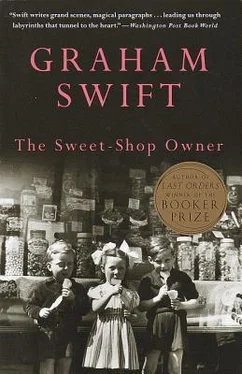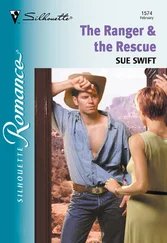Graham Swift - The Sweet-Shop Owner
Здесь есть возможность читать онлайн «Graham Swift - The Sweet-Shop Owner» весь текст электронной книги совершенно бесплатно (целиком полную версию без сокращений). В некоторых случаях можно слушать аудио, скачать через торрент в формате fb2 и присутствует краткое содержание. Год выпуска: 2012, Издательство: Vintage Books USA, Жанр: Современная проза, на английском языке. Описание произведения, (предисловие) а так же отзывы посетителей доступны на портале библиотеки ЛибКат.
- Название:The Sweet-Shop Owner
- Автор:
- Издательство:Vintage Books USA
- Жанр:
- Год:2012
- ISBN:нет данных
- Рейтинг книги:4 / 5. Голосов: 1
-
Избранное:Добавить в избранное
- Отзывы:
-
Ваша оценка:
- 80
- 1
- 2
- 3
- 4
- 5
The Sweet-Shop Owner: краткое содержание, описание и аннотация
Предлагаем к чтению аннотацию, описание, краткое содержание или предисловие (зависит от того, что написал сам автор книги «The Sweet-Shop Owner»). Если вы не нашли необходимую информацию о книге — напишите в комментариях, мы постараемся отыскать её.
The Sweet-Shop Owner — читать онлайн бесплатно полную книгу (весь текст) целиком
Ниже представлен текст книги, разбитый по страницам. Система сохранения места последней прочитанной страницы, позволяет с удобством читать онлайн бесплатно книгу «The Sweet-Shop Owner», без необходимости каждый раз заново искать на чём Вы остановились. Поставьте закладку, и сможете в любой момент перейти на страницу, на которой закончили чтение.
Интервал:
Закладка:
‘Bye.’
‘Goodbye.’
She didn’t come to the door. She had her excuse. She sat hunched with her shawl in the armchair.
‘Glad to have met you.’
I stood in the porch like some helpless mediator. I waved. The car lights winked, moving off down Leigh Drive. That was the only time I saw him, and the last time I saw you, without its being — what shall I say? — under conditions of truce.
He reached the end of Finch Street and passed beyond the gap in the railings.
Mrs Bennet said the world was ahead of you. Twenty-two that summer and your final exams to sit for. A First — as Mrs Bennet might have predicted. But no celebrations or congratulatory gifts and kisses. I only said to Mrs Cooper, who didn’t understand, ‘She got a First.’ ‘It’s the best you can get,’ I explained. ‘It means she’s got her degree.’ And I told Hancock, when he asked. ‘Always was a clever girl,’ he said. But I moderated my pride, in each case, for fear of the question that would follow — ‘What will she do now?’ You’d phoned up to tell us your result, almost disdainfully (‘Oh that’s wonderful news, Dorry, that’s wonderful’). And later you announced that you’d made up your mind to try for a Ph.D. Then nothing. Not even a word to say you’d be home for the summer. You had to vacate your college room at the end of the term but we could guess, surely enough, where you’d be living. Only a brief letter at the end of July, which said, ‘I’m taking a holiday. I’m going to Greece next month with Michael.’ ‘He’ll pay for her I suppose,’ was all she said, as if she were washing her hands of something. But I sent you a cheque, secretly, and wrote on the back of it: ‘For your holiday — enjoy yourselves.’ You didn’t return it. And four or five weeks later we got the postcard — a blue sea, white houses, a beach — marked somewhere in Crete; and on the back, signed only by you, was the message: ‘Enjoying ourselves.’
When I saw you next, that September, you still had traces of a sun-tan, but you didn’t want to discuss your holiday, and I felt jealous and thought of our meagre fortnights in Dorset.
She was in hospital again then — nothing bad; tests, observation. I hadn’t asked you to come. But did you time that visit carefully, knowing she wouldn’t be there? We didn’t do much talking. You had your large suitcase with you and you said you had to pick up some things. Books, papers, your tape-recorder. Yet most of those things had gone already. So why were you turning out drawers, taking things we could have kept for you, your perfume bottles from the bathroom, the Devon pottery that you bought in Teignmouth? You didn’t go to visit her at the hospital, and I never told her you were at home. ‘How’s Michael?’ I asked you. ‘Oh he’s fine, fine.’ But you didn’t say, ‘How’s Mother?’
And after that, letters, about once a month, which said little. Irene never read them, though she recognized them from the envelope. She left them to me as if they weren’t hers to touch. She seemed to be renouncing all contact with things. I opened them in the evening, and took them to the shop the next morning, tucked in my breast pocket (like this letter now), and I kept them, first in a cash tin in the safe, then in another tin — an old Oxo tin — which I have at home.
February, March, April ’73. Was it only last year? ‘How is she?’ was all Irene said after she knew I’d had a letter. ‘All right,’ I’d say and she’d turn and look away. ‘How is she?’ But that was more than you ever asked of her. Though she was dwindling, Dorry, in that armchair.
Another spell in hospital, that April. When I went to see her she was wired up and connected to some machine. Little wires from her neck, from her chest, a tube in her arm and nose. And she looked up oddly from beneath all that clutter, like a child who has put on a disguise or hidden behind something but easily been discovered. When she came home she said, ‘I’m going to have Barrett round. I want things to be settled.’ Barrett was her solicitor, Dorry.
And all this time I was working, harder than ever, in the shop. Though the face I saw in the mirror seemed to have become suddenly the face of an ageing, over-worked, livid-cheeked, corpulent man, a man who needed to ease off, take more recreation, retire. And already in my left side, though I scarcely noticed it till later, was that little pain, with its name like a rare butterfly’s.
April, May, June ’73. Then we got your letter, in July. It was the first one I showed her, though I was afraid — no stress, no excitement.
‘What will they do?’ She looked up blankly. ‘What will they live on? She won’t have any money.’ Though it wasn’t the money that troubled her. She raised her face and said — she who’d always seemed able to predict things — ‘What now? What happens now?’ Though behind those words there was something else, a cry, far off, as if sounding over waves — which I knew then I’d never stopped hearing.
I believe she would have seen Barrett again. She would have changed it, Dorry. If there’d been time.
Dear Mother and Father,
I’m giving up my course here. I can always finish the thesis later. Michael’s been offered a research post at Bristol and there’s a chance of a lecturership. I’m going with him to live with him.
32
The common littered with people. Couples fondling each other on the grass. Prams. Kids. Plastic balls. A commotion and a frenzied splashing down at the paddling pool. He made his way along the asphalt path, screwing up his eyes against the sun. He patted momentarily his breast pocket.
You can see it all from here, Dorry. The world ahead of you. Down there on the right, the stretch of the High Street where it flanks the common. Traffic lights beyond. Then the railway bridge: green sign with a white arrow pointing to the station. Domed roof of the Town Hall, gabled roof of Gibbs’ department store. There are the shops, straight ahead, on Common Road, where she used to get all her things; Mason’s the butcher’s, Cullen’s, Henderson’s. Beyond them — you could have seen the clock-tower once, over the roof-tops — the school where my parents toiled to send me. And, far-distant, half-left, poking up from the shoulder of the hill, the grey, ill-proportioned spire of St Stephen’s.
I met her here those first times, Dorry; here on the common. She looked as though she were lingering on some errand. And up there, at St Stephen’s, you were christened, and your grandfather, whom you never saw, was buried, near the plaque to his already dead son. We never moved out of these narrow bounds. Born here, schooled here, worked here. And even when I met her I stood here on the common and thought: enough, now everything is in its place, and I in mine.
Spire of St Stephen’s, domed roof of the Town Hall, grey paths across the green common; trams passing. The sun was warm on our necks as we leant on the railings. But I never believed you could have the real thing.
She would have acted, Dorry; would have seen Barrett. There was that last week. She would have said, ‘Willy —’
July ’73. Up the Common Road, past Mason’s and Cullen’s, past the evening plane trees, my briefcase, with the books, on the back seat. She was waiting for me to come. I used to let myself in, so as not to disturb her. How many times had I done these things? Past the clock and the mirror in the hall. It must have been between the time Mrs Pritchard left and I shut the shop. Her head was on one side. The cap still on her tube of pills: she hadn’t reached for them. Her lips were blue and cold and had a sickly smell when I bent to touch them.
He always claimed he’d seen her. That morning. Though they didn’t believe him, Stephen and Bob. Don’t believe what old Phil tells you. He didn’t tell Mr Chapman. It was an honour to do the round Mr Chapman’s house was on. Leigh Drive: number thirty-three. There was dew on the garden and sparrows chirping. She must have heard him put the papers through — always three or four dailies at thirty-three. For he saw her at the front window as he propped his bike on the opposite kerb. It was the only time he’d seen her. And she stood there for a moment, behind the window, pulling back the lace curtain — did she want to call him, to say something? — like someone trapped in a glass case.
Читать дальшеИнтервал:
Закладка:
Похожие книги на «The Sweet-Shop Owner»
Представляем Вашему вниманию похожие книги на «The Sweet-Shop Owner» списком для выбора. Мы отобрали схожую по названию и смыслу литературу в надежде предоставить читателям больше вариантов отыскать новые, интересные, ещё непрочитанные произведения.
Обсуждение, отзывы о книге «The Sweet-Shop Owner» и просто собственные мнения читателей. Оставьте ваши комментарии, напишите, что Вы думаете о произведении, его смысле или главных героях. Укажите что конкретно понравилось, а что нет, и почему Вы так считаете.












